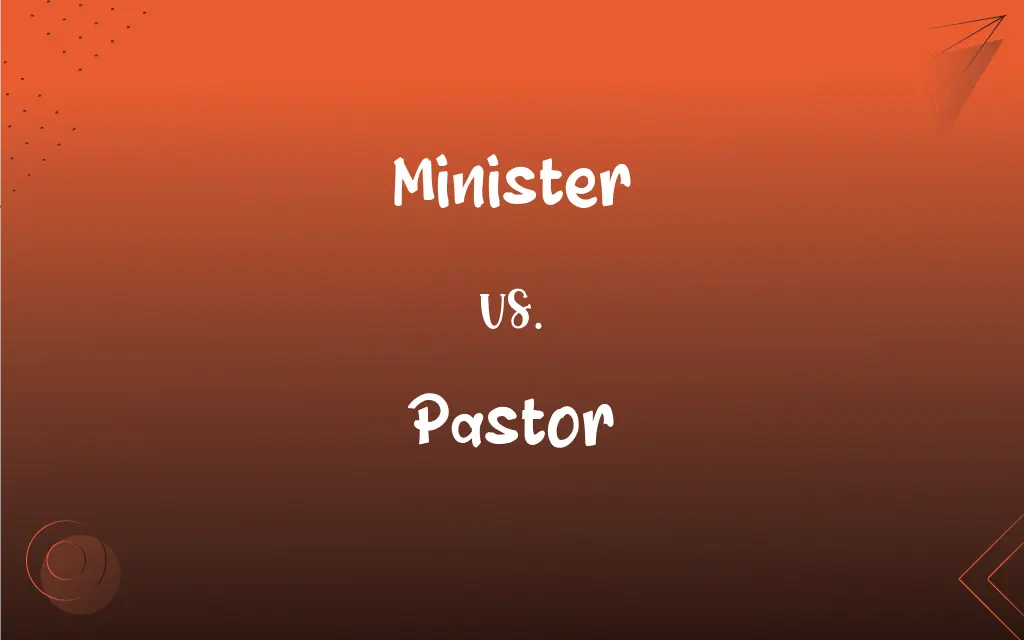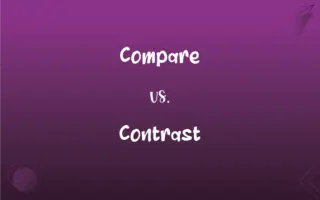Minister vs. Pastor: What's the Difference?
Edited by Aimie Carlson || By Harlon Moss || Updated on June 1, 2024
A minister is a broad term for a religious leader, while a pastor refers specifically to a spiritual shepherd of a congregation.

Key Differences
A minister is a general term for a religious leader authorized to conduct religious ceremonies, provide spiritual guidance, and manage religious organizations across various denominations. In contrast, a pastor is more specific, referring to a religious leader who shepherds a Christian congregation, primarily within Protestant denominations.
Ministers may have a broader scope of duties, including administrative roles and interfaith activities, depending on their religious tradition. Pastors often have a closer, more personal relationship with their congregation, focusing on community building and spiritual guidance.
While both terms can sometimes overlap, "minister" is a broader term encompassing various religious leaders, whereas "pastor" specifically denotes a Christian church leader focused on the care and leadership of a congregation.
Comparison Chart
Scope
Broad, various religious denominations
Specific to Christian (mainly Protestant) denominations
Duties
Conduct religious ceremonies, administration, interfaith activities
Preaching, teaching, pastoral care
ADVERTISEMENT
Focus
General religious leadership
Shepherding a congregation
Relationship
Can be formal or administrative
Often personal and community-focused
Examples
Found in Christianity, Unitarian Universalism, etc.
Primarily in Protestant Christianity
Minister and Pastor Definitions
Minister
A minister might engage in administrative and policy-making roles.
The minister developed new policies to streamline the church’s charitable activities.
Pastor
A pastor primarily shepherds the spiritual journey of a specific congregation.
The pastor visited each family to understand their spiritual needs.
ADVERTISEMENT
Minister
Ministers can serve in various religious sects and denominations.
The minister converted his home into a temporary shelter for the needy.
Pastor
Pastors usually conduct religious services and sermons for their congregation.
Every Sunday, the pastor enlightens the congregation with his insightful sermons.
Minister
A minister is a clergy member authorized to conduct religious worship.
The minister delivered a thought-provoking sermon on Sunday.
Pastor
A pastor is typically not involved in broader administrative responsibilities within a denomination.
The pastor dedicated his time to serving the local community rather than administrative duties.
Minister
A minister may have responsibilities within a particular denomination or multiple congregations.
The minister was responsible for establishing new churches in the region.
Pastor
Pastors provide personal spiritual advice and counseling.
The pastor counseled the couple, helping them navigate through their difficulties.
Minister
Ministers often engage in performing religious rites and sacraments.
The minister officiated the couple’s wedding with a heartfelt blessing.
Pastor
A pastor is deeply involved in the lives and events of their congregation.
The pastor organized a community event to foster stronger bonds among the members.
Minister
One who is authorized to perform religious functions in a Christian church, especially a Protestant church.
Pastor
A Christian minister or priest having spiritual charge over a congregation or other group.
Minister
Roman Catholic Church The superior in certain orders.
Pastor
A layperson having spiritual charge over a person or group.
Minister
A high officer of state appointed to head an executive or administrative department of government.
Pastor
(Archaic) A shepherd.
Minister
An authorized diplomatic representative of a government, usually ranking next below an ambassador.
Pastor
To serve or act as pastor of.
Minister
A person serving as an agent for another by carrying out specified orders or functions.
FAQs
What is a minister?
A minister is a clergy member who performs religious services and can have roles in various congregations or a wider denomination.
Can a pastor also be called a minister?
Yes, a pastor can be referred to as a minister, but not all ministers serve the specific, localized role of a pastor.
What defines a pastor?
A pastor is a spiritual shepherd focused on guiding, nurturing, and providing for the spiritual needs of a specific congregation.
Can one person be both a minister and a pastor?
Yes, a person can be both, especially if they perform broader religious and administrative duties (minister) while also shepherding a specific congregation (pastor).
How does one become a minister?
Becoming a minister typically involves theological study and may require ordination, but specific requirements can vary by denomination.
Can a person without a theological degree become a pastor?
While many pastors hold theological degrees, some denominations or congregations might accept or prefer experiential learning and personal qualities over formal education.
Can a woman be a pastor or a minister?
Yes, women can be pastors or ministers, but eligibility can depend on the specific beliefs of different denominations or religious groups.
Do all ministers perform religious ceremonies?
Most ministers are authorized to perform religious ceremonies, but the exact duties might vary based on their denomination and position.
Are there different types of ministers?
Yes, there can be various types of ministers, such as senior ministers, associate ministers, and youth ministers, each with distinct roles.
Can a minister belong to a non-Christian religion?
Yes, while "minister" is commonly associated with Christianity, its usage can extend to leaders in other religions, depending on cultural and linguistic norms.
Can a minister be involved in politics?
While ministers can express political beliefs, the extent of their political involvement may be guided by their denomination’s policies and/or legal stipulations.
How is a pastor involved in the community?
Pastors typically engage deeply with their congregation, providing spiritual guidance, conducting services, and often participating in or leading community events.
Can a pastor oversee multiple congregations?
Typically, a pastor is dedicated to one congregation, but exceptions might occur, especially in denominations with a shortage of clergy.
Is pastoral care only about spiritual matters?
While focused on spiritual matters, pastoral care often extends into providing emotional support and guidance on life matters to congregation members.
Are ministers restricted to a particular religion?
No, the term "minister" is used across various religions, though the role may differ between them.
Is a pastor’s role confined to the church?
While a pastor's primary role centers around the church and congregation, their influence and activities often extend into the broader community.
What are the educational requirements for becoming a pastor?
Educational requirements for pastors can vary but often involve theological study, which could be through seminary or a similar institution.
How does a pastor support a congregation's spiritual growth?
Pastors support spiritual growth through sermons, teachings, personal counseling, organizing religious activities, and being a moral and spiritual example.
What is the main duty of a minister?
A minister’s main duties often involve conducting worship services, administering sacraments, and providing spiritual guidance, though roles can be broader and vary significantly.
Does a minister have to be ordained?
Often, yes—ministers are usually ordained, but the specific processes and requirements can vary significantly between different denominations.
About Author
Written by
Harlon MossHarlon is a seasoned quality moderator and accomplished content writer for Difference Wiki. An alumnus of the prestigious University of California, he earned his degree in Computer Science. Leveraging his academic background, Harlon brings a meticulous and informed perspective to his work, ensuring content accuracy and excellence.
Edited by
Aimie CarlsonAimie Carlson, holding a master's degree in English literature, is a fervent English language enthusiast. She lends her writing talents to Difference Wiki, a prominent website that specializes in comparisons, offering readers insightful analyses that both captivate and inform.































































